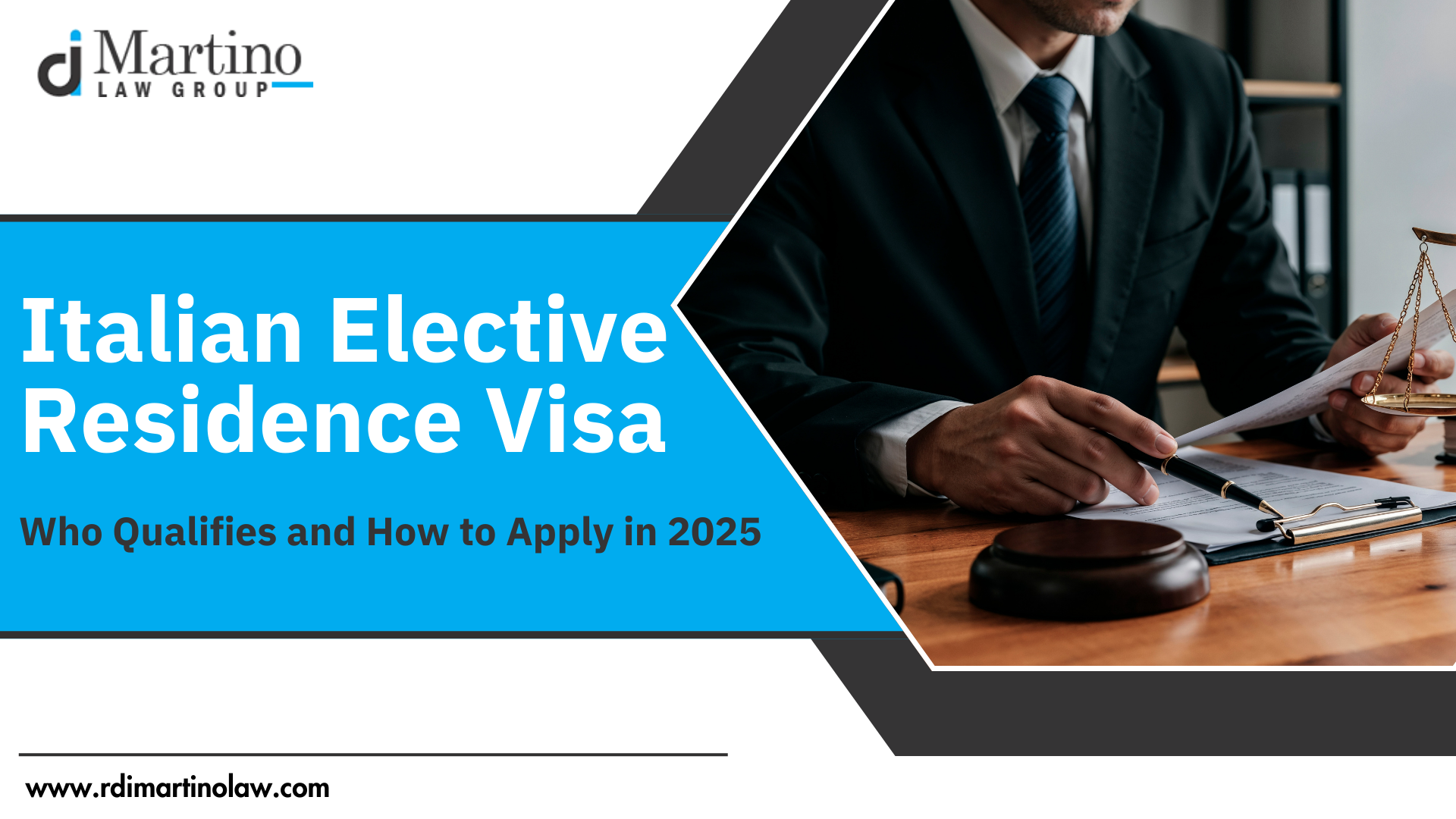Italian Elective Residence Visa: Who Qualifies and How to Apply in 2025

Basking in the sun-drenched splendor of Italy may seem like the stuff of fantasy—but for discerning global citizens with financial independence and a taste for refined living, Italy’s Elective Residence Visa (ERV) opens the door to that dream. Unlike most visas centered on employment or investment, the ERV is Italy’s invitation to those who wish to reside long-term, not for labor, but for lifestyle.
Whether you envision sipping espresso in a quiet Florentine piazza or tending olive groves in Puglia, the ERV might be your passport to a permanent chapter of la dolce vita. But make no mistake—this visa isn’t for the financially fickle or casually curious. It’s reserved for individuals with stable, passive income, genuine intent, and the capacity to self-sustain without touching the Italian labor market.
Let’s delve into the who, the how, and the crucial details for obtaining the Italian Elective Residence Visa in 2025.
What Is the Elective Residence Visa (ERV)?
The Italian ERV is a long-stay visa intended for non-EU citizens who want to live in Italy long-term, without working. Originally designed for retirees, it now appeals to financially self-sufficient individuals of all ages who wish to enjoy the Italian lifestyle. Crucially, employment or freelance work—either in Italy or remotely—is strictly prohibited under this visa.
This visa is ideal for:
- Retirees with pension income
- Investors living off dividends, royalties, or real estate earnings
- High-net-worth individuals with large savings or trust funds
- People with long-term rental income or annuities
Who Qualifies in 2025?
1. Financial Self-Sufficiency
Applicants must demonstrate ongoing, stable passive income sufficient to support their stay. While there’s no universally fixed threshold, the unofficial benchmark is a minimum of €31,000 per year for a single applicant—though individual consulates may require more based on location and lifestyle assumptions.
Sources of acceptable income include:
- Private pensions
- Property rental income (from outside of Italy)
- Investment yields (dividends, interest)
- Royalties
- Annuities or trust fund disbursements
Savings alone may not suffice—unless the amount is so substantial that it reasonably supports a prolonged stay without depleting the principal.
2. Suitable Accommodation in Italy
Before you apply, you must secure long-term accommodations. This could be:
- A notarized purchase deed for a home or apartment
- A registered lease agreement (generally for a minimum of 12 months)
Short-term stays or hotel bookings will be rejected as insufficient.
3. Health Insurance Coverage
Italy mandates all ERV applicants to hold private health insurance that:
- Covers all medical expenses in Italy
- Offers at least €30,000 in coverage
- Remains valid throughout your initial stay (minimum one year)
- Proof of this coverage must be included in your visa application.
4. No Employment Intentions
The ERV is not for remote workers, freelancers, or entrepreneurs—even if your clients or companies are outside of Italy. Any indication of professional engagement can lead to denial. This visa is solely for individuals who wish to reside peacefully without participating in the local or international labor market.
5. Clean Criminal Record and Genuine Intent
While Italy doesn’t always require a formal police clearance certificate, any red flags discovered during background checks may lead to denial. Additionally, applicants must show a clear motivation to settle in Italy, often supported by a personal letter detailing their reasons and intended lifestyle.
How to Apply for the Elective Residence Visa (ERV) in 2025
The application process is straightforward in structure but demands thorough preparation and patience.
Step 1: Gather Required Documents
Prepare a comprehensive dossier that includes:
- Completed long-stay visa application form
- Valid passport (minimum 1-year validity)
- Two recent passport-sized photos
- Proof of passive income (bank statements, pension slips, dividend receipts, etc.)
- Lease agreement or property deed
- Comprehensive private health insurance
- A motivational letter explaining your desire to live in Italy
All documents not originally in Italian may need certified translations. Some consulates may also request apostilled versions of official documents.
Step 2: Submit Your Application to the Italian Consulate
You must apply in your home country, through the Italian consulate or embassy with jurisdiction over your area of residence. Walk-ins are rarely accepted—secure an appointment and expect a thorough interview process. Be ready to answer questions about your lifestyle, financial stability, and connection to Italy.
Step 3: Await the Decision
Processing times vary by country, ranging from 30 to 120 days. There’s no guarantee of approval, so a well-prepared application with no ambiguity is essential. Once granted, your visa will typically be valid for one year.
Step 4: Enter Italy and Apply for the Permesso di Soggiorno
After entering Italy, you must visit the local immigration office (Questura) within eight working days to apply for your Permesso di Soggiorno (residence permit). This legalizes your stay and allows you to reside legally in Italy under the terms of the ERV.
Renewals and Extensions
While the initial ERV is valid for one year, it can be renewed annually. To qualify for renewal, you must:
- Maintain your passive income source
- Continue residing in Italy (not just visiting periodically)
- Not engage in employment
- Provide updated documents similar to the initial application
After five years of uninterrupted residence, you may apply for long-term EU residency, which offers more stability and fewer restrictions.
Family Reunification Under ERV
You can apply to bring your spouse and dependent children, but additional financial requirements apply. Generally, an extra €20,000 to €25,000 per year is needed for a spouse, with more for each child. Proof of family ties and health insurance is also mandatory.
Pitfalls to Avoid
Working remotely while on ERV: This can lead to serious legal trouble, including visa revocation.
Inadequate income documentation: Your financial evidence must be impeccable—any doubts can result in rejection.
Missing deadlines for residence permit: The eight-day post-arrival window is strict. Missing it can cause severe complications.
Applying from within Italy: You must apply from your country of residence—applying inside Italy will lead to automatic rejection.
Conclusion: A Gateway to Elegance, Not Employment
The Italian Elective Residence Visa is not just a residency permit—it is an invitation to a more graceful pace of life. Reserved for the financially autonomous and culturally curious, the ERV offers a pathway to immerse yourself in Italy’s poetic rhythms, historic echoes, and culinary treasures.
Yet this dream demands discipline, clarity, and preparation. With the right documents, the right intentions, and a patient approach, your Italian chapter can begin—rooted not in business or bureaucracy, but in balance, beauty, and belonging.
Note: IndiBlogHub features both user-submitted and editorial content. We do not verify third-party contributions. Read our Disclaimer and Privacy Policyfor details.




